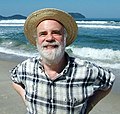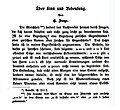Saul Aaron Kripke (/ˈkrɪpki/; November 13, 1940 – September 15, 2022) was an American analytic philosopher and logician. He was Distinguished Professor...
50 KB (6,479 words) - 02:24, 25 August 2024
Southview High School in 1992. His cousin was Saul Kripke, an influential philosopher and logician. Kripke often created home movies with friends to show...
16 KB (1,221 words) - 12:31, 19 July 2024
books, and the mother of Saul Kripke Eric Kripke (born 1974), American television writer, director, and producer Madeline Kripke (1943–2020), American book...
733 bytes (129 words) - 21:46, 26 November 2023
Theory of descriptions (section Saul Kripke)
according to the hair of the pretender. In Reference and Existence, Saul Kripke argues that while Donnellan is correct to point out two uses of the phrase...
21 KB (2,968 words) - 08:21, 10 May 2024
The Kripke–Platek set theory (KP), pronounced /ˈkrɪpki ˈplɑːtɛk/, is an axiomatic set theory developed by Saul Kripke and Richard Platek. The theory can...
8 KB (1,321 words) - 12:19, 1 January 2024
Liar paradox (section Saul Kripke)
hierarchy (although bounded versions of the sentence are possible). Saul Kripke is credited with identifying this incompleteness in Tarski's hierarchy...
31 KB (4,399 words) - 18:45, 14 July 2024
non-classical logic systems created in the late 1950s and early 1960s by Saul Kripke and André Joyal. It was first conceived for modal logics, and later adapted...
34 KB (4,751 words) - 13:41, 28 February 2024
structure is a variation of the transition system, originally proposed by Saul Kripke, used in model checking to represent the behavior of a system. It consists...
6 KB (718 words) - 21:21, 20 August 2024
Wittgenstein on Rules and Private Language (category Books by Saul Kripke)
Rules and Private Language is a 1982 book by philosopher of language Saul Kripke in which he contends that the central argument of Ludwig Wittgenstein's...
14 KB (1,913 words) - 21:14, 13 April 2024
Analytic philosophy (section Kripke)
O. Quine, and Karl Popper. After the decline of logical positivism, Saul Kripke, David Lewis, and others led a revival in metaphysics. Analytic philosophy...
95 KB (11,024 words) - 08:26, 29 August 2024
Ludwig Wittgenstein (section Saul Kripke)
and Philosophy. Cambridge University Press. ISBN 978-0-521-00868-6. Kripke, Saul (1982). Wittgenstein on Rules and Private Language. Harvard University...
192 KB (22,148 words) - 07:05, 20 August 2024
Naming and Necessity (redirect from Kripke's theory of names)
book with the transcript of three lectures, given by the philosopher Saul Kripke, at Princeton University in 1970, in which he dealt with the debates...
16 KB (2,084 words) - 08:02, 13 June 2024
Meaning (philosophy) (section Saul Kripke)
predicate calculus in order to reduce meaning to a function of truth. Saul Kripke examined the relation between sense and reference in dealing with possible...
47 KB (6,509 words) - 23:09, 21 May 2024
Direct reference theory (section Saul Kripke)
proponent of direct reference theory. Saul Kripke defended direct reference theory when applied to proper names. Kripke claims that proper names do not have...
7 KB (903 words) - 14:02, 12 August 2024
the 1970s, this theory came under attack from causal theorists such as Saul Kripke, Hilary Putnam and others. However, it has seen something of a revival...
18 KB (2,854 words) - 21:27, 8 July 2024
mid twentieth century from work by Arthur Prior, Jaakko Hintikka, and Saul Kripke. Recent developments include alternative topological semantics such as...
60 KB (8,455 words) - 22:22, 30 May 2024
Linguistic turn (section Quine and Kripke)
wedded to the word." Later in the twentieth century, philosophers like Saul Kripke in Naming and Necessity drew metaphysical conclusions from closely analyzing...
7 KB (742 words) - 08:21, 25 August 2024
Better Call Saul Saul Katz (born 1939), President of the New York Mets baseball team Saul Kripke (1940–2022), American philosopher and logician Saul Landau...
4 KB (440 words) - 07:27, 15 August 2024
popular during the 1970s, under the influence of work by Saul Kripke and Keith Donnellan. Kripke and Hilary Putnam also defended an analogous causal account...
13 KB (1,870 words) - 11:26, 19 August 2022
Property dualism (section Saul Kripke)
epistemic property dualism. It is rarely advocated by philosophers nowadays. Kripke has a well-known argument for some kind of property dualism. Using the concept...
10 KB (1,105 words) - 14:36, 10 July 2024
Modal realism (section Kripke's response)
Blackwell) Saul Kripke, "Naming and Necessity". Semantics of Natural Language, D. Davidson and G. Harman [eds.], [Dordrecht: D. Reidel, 1972] Saul Kripke, "Identity...
28 KB (3,855 words) - 10:32, 8 August 2024
italics in original §202 Kripke, Saul. Wittgenstein on Rules and Private Language. Basil Blackwell Publishing, 1982. Kripke, Saul. Wittgenstein on Rules...
22 KB (3,326 words) - 09:04, 29 March 2024
since been more clearly separated from each other. American philosopher Saul Kripke (1972), for example, provides strong arguments against this position...
27 KB (2,930 words) - 19:54, 26 August 2024
it solves some very important problems in the philosophy of language. Saul Kripke has argued that "Water is H2O" is an example of the necessary a posteriori...
36 KB (4,450 words) - 18:27, 15 August 2024
Semantic theory of truth (redirect from Kripke's theory of truth)
as a correspondence theory or as a deflationary theory. Kripke's theory of truth (Saul Kripke 1975) is based on partial logic (a logic of partially defined...
9 KB (1,050 words) - 17:46, 9 July 2024
about proper names. Such descriptivism was criticized in Saul Kripke's Naming and Necessity. Kripke put forth what has come to be known as "the modal argument"...
66 KB (8,567 words) - 10:37, 26 August 2024
Necessity of identity (section Kripke's derivation)
are the same object. The thesis is best known for its association with Saul Kripke, who published it in 1971, although it was first derived by the logician...
5 KB (831 words) - 16:43, 3 August 2023
Truth (section Kripke's semantics)
systems that have yet to be resolved to this day. Kripke's theory of truth (named after Saul Kripke) contends that a natural language can in fact contain...
105 KB (13,169 words) - 13:45, 25 August 2024
"Frege–Russell" view was the orthodox view of proper name semantics. Saul Kripke argued compellingly against the descriptivist theory, asserting that...
17 KB (2,206 words) - 07:46, 17 August 2024
those worlds in which that object does not exist. The term was coined by Saul Kripke in his 1970 lecture series at Princeton University, later published as...
3 KB (386 words) - 00:07, 26 March 2024







